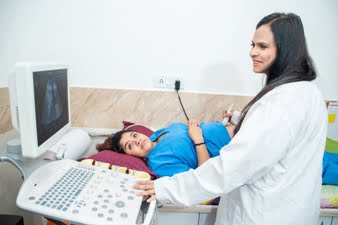Why is a Scrotal Ultrasound Important?
A scrotal ultrasound is primarily used to:
1. Diagnose Scrotal Pain: If a man experiences pain or discomfort in the scrotum, an ultrasound can help determine the cause, whether it's due to infection, trauma, or torsion (twisting of the spermatic cord).
2. Detect Lumps or Swelling: Ultrasound helps identify the nature of lumps or swelling in the scrotum, which could be due to cysts, hydrocele (fluid collection), varicocele (enlarged veins), or tumors.
3. Evaluate for Testicular Torsion: Testicular torsion is a medical emergency where the spermatic cord twists, cutting off blood flow to the testicle. Early detection through ultrasound is critical to prevent damage to the testicle.
4. Assess Infertility Issues: Ultrasound is often used to assess the anatomy and condition of the testes and epididymis in men who are facing fertility problems. It can help diagnose conditions such as varicocele or epididymitis.
5. Monitor Post-Surgical Recovery: After surgical procedures like testicular surgery or hernia repair, ultrasound may be used to monitor the recovery process and check for complications.
If you're looking for a reliable USG Scrotum in Pune, Diagnopein offers precise and comfortable diagnostic services. As the best sonography centre in Pune, we specialize in assessing scrotal health, detecting conditions like varicocele, testicular torsion, and cysts. Our experienced technicians use state-of-the-art equipment to provide accurate results. Whether you're experiencing pain or discomfort or need a routine checkup, our team ensures a professional and caring environment. Visit us for comprehensive ultrasound services, ensuring peace of mind with quick and accurate diagnoses. Trust Diagnopein for all your scrotum ultrasound needs in Pune.
Who Should Consider a Scrotal Ultrasound?
A scrotal ultrasound is often recommended for:
1. Men with Scrotal Pain: Individuals experiencing pain, discomfort, or swelling in the scrotum may require an ultrasound to identify the underlying cause.
2. Infertility Investigations: Men experiencing fertility issues may undergo a scrotal ultrasound to check for conditions such as varicocele or epididymitis, which can affect sperm production.
3. Presence of Lumps or Swelling: If a lump or swelling is noticed in the scrotum, an ultrasound can help determine whether it's a benign condition like a hydrocele or something more serious like a tumor.
4. Post-Surgical Monitoring: Men who have undergone scrotal or testicular surgery may need an ultrasound to ensure proper healing and rule out complications.









